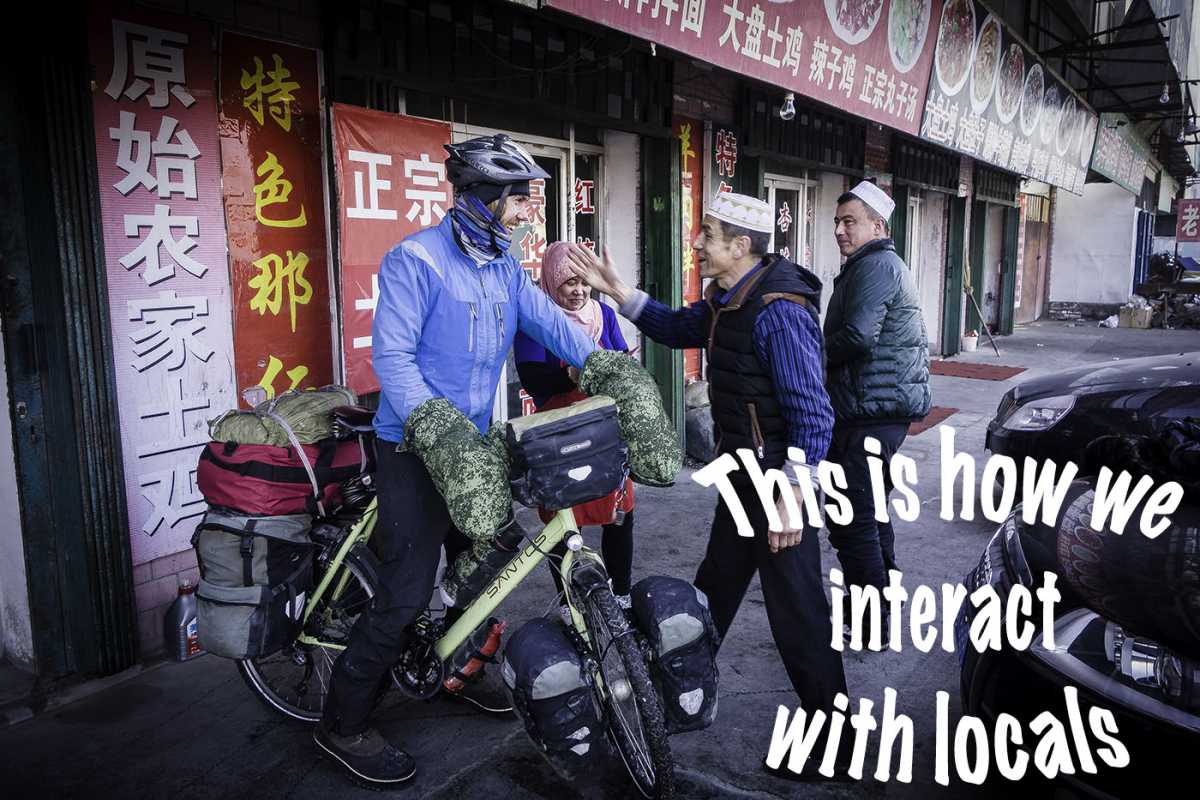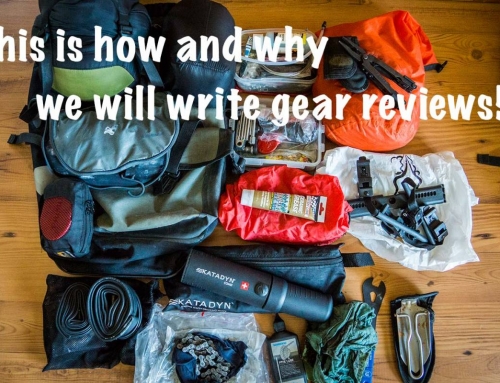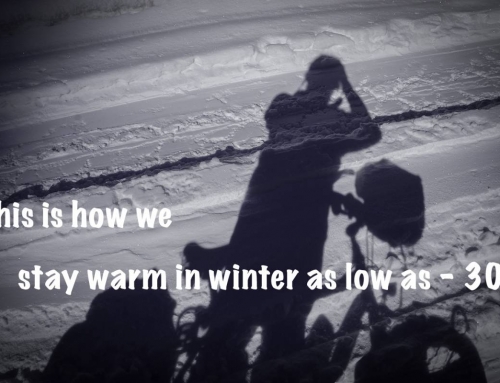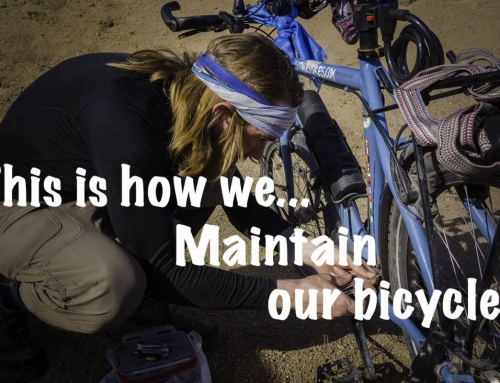‘This is how we interact with locals’ is part of the series “This is how… by TwistingSpokes.com”. During our journey we very much enjoy the interaction with local people on the road, in small villages and in cities. But communication and interaction is not always easy. In this post we will explain how we approach these interactions.
We are very much aware that how we look influences the way we interact with locals. We are two westerners on bicycles with huge bags and we are noticed on the road. We find it very important to adapt as much as we can when we are on the road to shorten the distance between us and the people around us. This is one of the reasons also why we travel by bike.
Shortening the distance between us and locals is not always easy. We make sure we dress modest and appropriate. We don’t cycle in tank tops and spandex, it doesn’t suit us but more importantly it creates distance. We try to accustom to the norms in the countries we travel in. In many countries we have travelled through people are not affectionate against their partners in the everyday outside life. We know that people are looking at us so we make sure to also be modest in these situations.
Local interactions starts with knowing a few words of the language used. We always try to learn ‘hello’ and ‘thank you’. In Central Asia we tried to learn in every country but mostly people spoke to us in Russian. This was convenient because we could use Russian for quite a time period through the Stans. It is appreciated when we can say a few words in the local language. Knowledge of the local language is practical when communicating, also this is a step into understanding the local culture.
Next to that we have tried to adapt a universal sign language. But we have also found out that universal sign language does not really exist and is linked to concepts that you know at home. For instance, a tent (folding your hands together with a pointed roof) is something they can relate to in Europe but not in Mongolia, in Mongolia they only know their ger. And food is not always the same. In China it is a bowl with noodles with sticks (cup your left hand as a bowl and with right hand direct imaginary sticks to your mouth), in parts of Asia where the eat Laghman you can hold your hands outstretched to left and right and make a swinging movement like your jump roping. This indicates how noodles are made and people know exactly what we wanted to eat.
What makes it easy is that bare necessities are the same in every country. People want to drink water, to eat and to sleep when it gets dark. Because of these simple principles it is easy to communicate. Also the questions on the road to us are pretty much the same. Where are you from? Where are you going? How long have you been traveling? How much can you cycle in a day? Where are you going to sleep? In Russian and Turkish we could give quite accurate answers to these questions. Since hitting China, Mongolia and Korea the questions are not so easy to recognise but we still think the same questions are asked
The great hospitality along the way has really been overwhelming and a real surprise. We have read about how people will invite you home and by using online communities such as www.warmshowers.org.
In reality it is more than we could ever have thought about. These situations really makes a big difference to our journey. We always step carefully when in someones house and follow their customs.
In some situations we will try and share the food we carry as we know the people do not have a lot but they really want to treat their guests well. In a few situations we have left a small amount of money just to help out a little bit and show our appreciation. This has never been more than 10$, just to cover costs in certain situations and should be considered carefully.
On the road we happened to find a phrase book for Iran. This made everything easier and much more interesting while being in Iran. We got invited into the house many times and because of this book it was possible to exchange questions and answers both ways. Since then we have tried to find a phrase book most times because it does help (although searching in phrase books takes time as well).
Still communication is hard sometimes. Especially if you think somebody has understood what you are asking and the answer or outcome is completely different from what you expect. In China as we have also written how everything changed when we entered China the first time. From counting to body language this really is different in China.
One time when we were staying in this small town, we went for dinner as this was by the sea it was mainly sea food and we weren’t in the mood for sea food. We tried our best to order some fried chicken and vegetables, this was a challenge and after hand signs, phrase book we thought we had succeeded. When we got the food it was clear that we had a small misunderstanding as we got vegetables and sea food here we just wanted the vegetables. When the chicken arrived we could only laugh as the plate was one whole chicken with feet and head, all was there 
Also negotiating prices sometimes is unclear if the amount agreed on is actually the true amount. Again in China we had asked a hotel for their price. It looked expensive but they came up with a price that was below our limit of 100 yuan that night. But in China you pay deposit, usually 300 yuan, so it was still not clear to us. Registering was difficult because the system didn’t work (always complicated with foreigners in China) and the bicycles was also not clear if they would be safe. The woman was very helpful and wanted to make everything very clear to us but she spoke only very limited English. So she decided the best way to make us understand was to write it down, in Chinese… She honestly thought we would understand but we felt a bit helpless. Eventually it all worked out and we could stay for the price agreed!
Another real change was when we arrived in Iran. Iran is a really nice country and people are very friendly, but there are some interaction codes that are quite different than what we are brought up with. Susanne would almost never be greeted, greetings would always be towards Martin and sometimes she would not even be acknowledged. We have had situations where Martin has been asked ‘what is the name of your wife’ as if Susanne couldn’t speak. Also it is not accustomed to shake hands between men and women. Some men tried, what do you do? We decided it would be better to keep to Iranian custom, although some men really wanted to shake the hands of a western woman. These experiences are not bad, they are hard, but not bad. It shows how different we view the world from people being raised in other cultures and we don’t think one is better than the other, just different.
Being on the road for such a long time we have come to relax a lot more in situations where we don’t understand everything while we interact with locals. I think we both like to be in control of quite a few things and interactions with locals is something you can’t control because there are other people involved. We might get a spontaneous invitation, a nice conversation, a wave or just a stare. For us it shows that we make a small impact in the lives of the people we meet and they make a huge impact in our lives sharing their view on the world. These interactions is really what makes a journey like ours so special.
















Hi Andrea, thanks for sharing your experiences with us. India is going to be interesting in many ways. Hope the previous countries have made me more prepared for what I can expect there. Cultural differences really ar hard to understand sometimes but something that is part of traveling of the beaten track. Take care!
I think one of the reasons why women are not acknowledged in islamic countries or traditional places such as india is because it is assumed that it is inappropriate/off limits to talk to a man’s wife. Its not a question of rudeness. She is considered his and any interaction with his wife could be construed as a lack of respect at best and a sexual transgression at worst. Anyway leeway you might make in this regard could easily lead to a line being crossed with regrets for you both. It happened to me when i was much younger (23) and in Turkey. We were at a man’s house for dinner. The man had been friendly with my partner for a long time but this was the first time he’d been invited home. After the meal, i was offered a face massage in front of his wife who sat nearby. I said no. He gave one to my partner. And then to be polite, I gave in and let him give me one but he rubbed his hands up and down my chest twice in front of everyone. Shocked! But we didn’t make a fuss. There was another incident on another day but its tedious to try to recall it properly. But it was as though the man thought my partner had given him permission.
I had a friend who travelled with her partner in india and she found it very difficult being ignored in the way you describe. I would too. Most of us westerners would.
If i were to go to Iran, i expect i would probably not get as much hospitality offered as couples and men do. In india I was never invited home by men, only women.